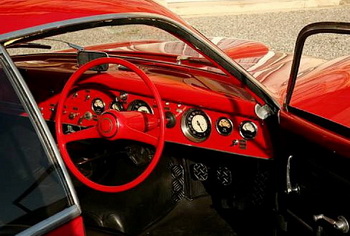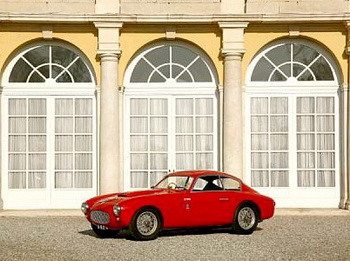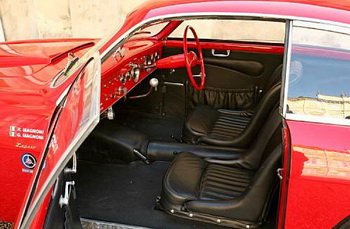

 |
|
The only right had drive Fiat 8V ever built
which was raced in its day in events
including the Coppa d'Oro delle Dolomiti,
the Targa Florio and the Coppa Inter-Europa
at Monza, which it won, will be offered for
auction later this month at Bohhams
Automobiles d'Exception á Rétromobile. |
|
|
|
The only
right had drive Fiat 8V ever built which was raced in
its day in events including the Coppa d'Oro delle
Dolomiti, the Targa Florio and the Coppa Inter-Europa at
Monza, which it won, will be offered for auction at Bohhams Automobiles d'Exception á
Rétromobile in Paris on January 23. The estimated price
is 530,000-650,000 euros.
An unusual
and exciting diversion for a company whose post-WW2
success was founded on the volume production of
value-for-money transportation, the FIAT 8V ('otto vu')
was launched at the 1952 Geneva Salon. Rather than a
series production model, the 8V had been conceived as
the company's exclusive image-making flagship as well as
a contender in international 2-litre GT class racing.
Designed by Dante Giacosa, the 8V's 1,996cc,
overhead-valve, all-alloy V8 engine had been intended
for a proposed luxury saloon. In the event, the latter
never materialised and the motor was only ever used to
power the 8V, a mere 114 of which were made between 1952
and 1954.
An advanced design, Giacosa's V8 was heavily over-square
with bore/stroke dimensions of 72x61.3mm, and breathed
via two twin-coke Weber carburettors. Varying states of
tune were available, ranging from 105 to 127bhp. The
8V's coil-sprung suspension was equalled advanced, being
independent all round (a first for FIAT) while the
in-house coachwork, designed by Fabio Rapi, is surely
one of the most beautiful shapes ever created by a major
automobile manufacturer. Sleek, elegant and remarkably
aerodynamically efficient, it bears direct comparison
with the finest of contemporary work from Italy's
leading independent carrozzeria. Body construction was a
form of semi-monocoque, the outer shell being supported
on a lightweight superstructure that conferred great
structural rigidity.
The 8V was a popular choice with competitors in the long
distance events of its day in which it enjoyed
considerable success, with no fewer than 13 entered in
the 1953 Mille Miglia. Capelli gave the model its first
outright victory, in the 1952 Stella Alpina, while
further leader-board placings were gained in the Pescara
12 Hours, Rally de Sestriere and Coppa Inter-Europa.
Other notable 8V campaigners included Consalvo Sanesi
and Elio Zagato, whose car featured a body of his firm's
own design.
This matching-numbers Fiat 8V is the only right-hand
drive example ever built and thus unique. Chassis number
'065' was raced in period, entering such events as the
Coppa d'Oro delle Dolomiti, the Targa Florio and the
1955 Coppa Inter-Europa at Monza where it finished 1st
overall, ahead of Elio Zagato's 8V. Many years later,
the 8V passed into the ownership of Elio Zagato's son,
Andrea, who completely restored the car in 1990 and
after completion drove it in the Mille Miglia Storiche
in 1991 and 1992 (competitor number '161' and '243'
respectively) and the Mille Miglia Festival in Japan.
The 8V's last owners were the family of talented
engineer, Carlo Leio di Priolo, the most successful
racer of the FIAT otto vu and co-designer with Elio
Zagato of the Alfa Romeo Sprint Veloce Zagato. While in
the di Priolo family's ownership, the car participated
in the Mille Miglia Storiche on two further occasions:
in 2007 and 2008. Presented in very good running order,
this rare and historic example of Fiat's legendary 'otto
vu' comes with Andrea Zagato's letter confirming his
past ownership; sundry invoices relating to work carried
out over the past two years; valid FIVA papers; and
Netherlands registration document.
|